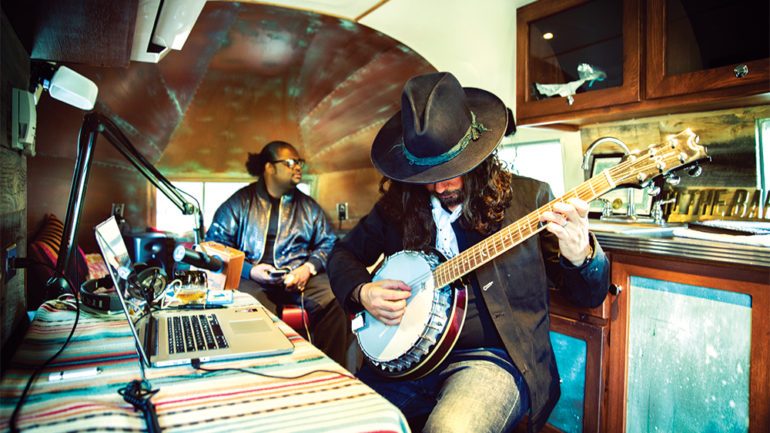Bob Dylan, T Bone Burnett Feature on Album by Americana Duo Bear and a Banjo (EXCLUSIVE)
By Paula Parisi
LOS ANGELES (Variety.com) – Jared Gutstadt, the co-founder of production music house Jingle Punks and a multi-instrumentalist who favors guitar and drums, is extending beyond his field with the release of his first album of original material under the name Bear and a Banjo. In typical Punks style, Gutstadt — who performs under the name Jingle Jared — is taking a somewhat disruptive approach. The songs will form the basis of a narrative podcast series released through iHeartMedia’s new podcasting unit Stuff Media .
Co-written and recorded with Grammy-winning hitmaker Jason “Poo Bear” Boyd and produced by T Bone Burnett, the group’s eight-song collection of low-fi Americana is gritty and poetic. Infused with blues, rock and hip-hop, it has the whiskey-fueled charm of music recorded in an Airstream trailer (which it was, in Gutstadt’s Brentwood backyard).
The podcast, which Gutstadt plans to shop as a potential television series, will further amplify the offbeat vibe the songs hint at. “T Bone Burnett, who is truly the Alan Lomax of our time, is a musicologist and an interpreter of folk traditions as pop culture, as with his work with the Coen brothers, and Bob Dylan’s ‘Rolling Thunder Review,’” says Gutstadt, citing in addition to those inspirations the book “The Old, Weird America: The World of ’s Basement Tapes,” by Greil Marcus, among his inspirations. Dylan himself contributed lyrics to one of the Bear and a Banjo songs, “Gone But Not Forgotten,” which can be heard here for the first time, along with a second track, “Can You Hear Me Now.”
Former TBS and TNT director of digital innovation Jimmy Jellinek, now a producer and content creator at ITV, has been hired to script the project, which will feature a single narrator spinning yarns at the intersection of folk and noir. “I’m reading the [2017] book ‘Why Bob Dylan Matters,’ which talks about how poetry shouldn’t reveal everything, but have layers which can be peeled back so people can discover their own meaning. We have as a jumping off-point the songs, amplifying that somewhat through narrative scripts, but at the service of the listener, and hopefully at some point the anthology viewer’s imagination,” Gutstadt says.
While Gutstadt launched his professional music career 10 years ago with the start of , a production music house (with offices in New York, Los Angeles, Toronto and London), he adds. “I wasn’t ready five years ago to make this record. It took three to four years of development, making this album with Poo and T Bone and Bob Dylan’s camp to get it right. The last piece of the puzzle was a conversation with one of Jingle Punk’s biggest partners, iHeartMedia, which just acquired one of the largest podcast companies in the industry, and taking it from there.”
Gutstadt and Poo Bear met through a brand collaboration for History’s 2016 “Roots” miniseries reboot, contributing two songs. A remix of one, “Born This Way,” is included on the Bear and Banjo album.
Although the early 2019 release, shared here publicly for the first time, was a labor of art, it has already made Jingle Punks some money. The principals previewed the record at last year’s Stream USA in Ojai. It caught the ear of Jaymee Messler, president of sports branding agency the Players Tribune, who asked, “‘Do you want to write a song for the Miami Marlins?,’ and within weeks Poo and I were down in Miami in a board room with Derek Jeter.”
A go-to songwriter and producer for Justin Bieber, Poo Bear says he’s enjoyed his adventures in jingleland, which allow him to explore different styles and skills. “I’ve always been interested in the brand space, but it’s not something you just jump into. If it were easy I would have already been doing it, but it took getting involved with Jingle Punks. Jared has gotten me into meetings you’re not going to get through a publishing company, which is so focused on hit songs and the radio,” he says. When Gutstadt approached him, he didn’t need to be convinced. “A lot more people are going to hear a hear song than see commercial. I wanted to make not jingles but hit songs that embody brands. That really hadn’t been done, and it still isn’t really being done the way we do it together.”

